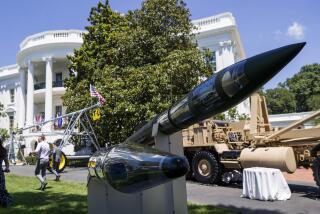Nigerians to Deploy to Liberia
- Share via
UNITED NATIONS — Nigeria will soon send two vanguard battalions to Liberia to pave the way for a possible multinational intervention in the battered West African country, the senior U.N. envoy to Liberia said Thursday.
The envoy, Jacques Klein, told the Security Council that the first battalion of about 770 soldiers would transfer to Liberia from a U.N. peacekeeping mission in nearby Sierra Leone. Another battalion would soon follow from Lagos, Nigeria.
Klein said he hoped the United States and other countries would also send troops after the arrival of the Nigerians, who would be backed by the Economic Community of West African States, or ECOWAS.
“We stand between two options: hope and disaster,” he told reporters after meeting with the Security Council. “Hope that we can quickly move troops in, stop the killing, stabilize the situation. Disaster -- nothing is done.”
Rebels battled troops loyal to Liberian President Charles Taylor on Thursday for control of the port of Monrovia, the capital. Klein said that the humanitarian crisis in Liberia demanded that soldiers move very quickly, but added that the Nigerian deployment would take at least a week to 10 days.
“Hopefully, once that ... structure was in place, that would trigger the American response,” he said.
Washington, with historic ties to the African nation that was settled by freed American slaves in 1822 and established as an independent country 25 years later, has yet to announce a decision about whether U.S. troops might intervene.
The Pentagon said Thursday that three U.S. ships carrying 2,300 Marines were positioned in the Mediterranean for possible deployment to Liberia. The U.S. government has also offered $10 million for the Nigerian troops’ transport and logistical needs.
“The president has not yet made a decision as to whether or not the United States would commit troops beyond logistics and support troops and efforts,” Secretary of State Colin L. Powell told reporters. “With respect to combat troops on the ground, that’s still under consideration. The president is examining the options.”
At a Senate Armed Services Committee hearing, Air Force Gen. Richard B. Myers, chairman of the Joint Chiefs of Staff, said, “Whatever the fix is going to be is going to have to be a long-term fix.”
He also said, “As a military person, I’m concerned ... that we have a very clear mission ... that we have an idea of when the mission is going to be over ... and that we have sufficient force to deal with the security situation.”
Marine Corps Gen. Peter Pace, vice chairman of the Joint Chiefs, said, “It is potentially a very dangerous situation.”
Nancy Soderberg, vice president of International Crisis Group, a think tank dedicated to conflict prevention, said the U.S. would have to send troops because “there’s no one else to do it the way they can.”
Klein pleaded for immediate action.
“I need a battalion tomorrow morning and another in four days, and then hopefully we’ll have more,” he said, brimming with anger. “But right now we have nothing.”
More to Read
Sign up for Essential California
The most important California stories and recommendations in your inbox every morning.
You may occasionally receive promotional content from the Los Angeles Times.













